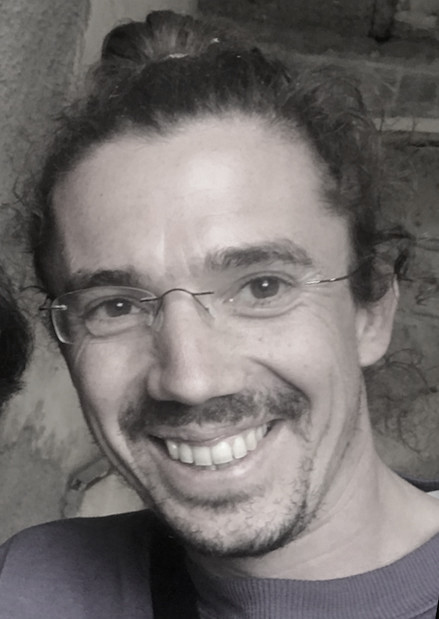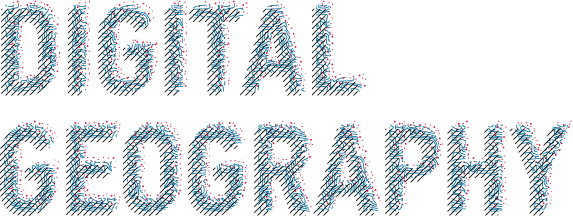
Contact
Digitale Geographie
Institut für Geowissenschaften und Geographie
Martin-Luther-Universität Halle-Wittenberg
Raum H4 2.41.1
Von-Seckendorff-Platz 4
06099 Halle (Saale)
Link zur Anfahrt
Office hours by appointment
CV
- since Sept. 2022: PhD on “Searching for engaged catrography – materialities and multiple spatialities in practices of collective critical mapping” at the Matin-Luther-University Halle-Wittenberg (MLU), scholarship holder of the Hans-Böckler-Foundation.
- 2021: mLAB Residency “Uncertain Calibrations” at the Institute of Geography, University of Bern
- since 2019: Lecturer at the Institute Experimental Design and Media Cultures (IXDM), Academy of Art and Design, Basel
- 2012 – 2017: Master’s degree in “Geographies of Globalization: Markets and Metropolises” at the Goethe-University Frankfurt and the Universidade de São Paulo (USP)
- 2009 – 2012: Bachelor in Human Geography at the Goethe-University Frankfurt and the Universidade do Porto (UP)
- since 2009: Member of kollektiv orangotango, workshops and action research on collective critical cartography and artistic interventions in public space as well as hosting the “This Is Not an Atlas” platform.
Publications
- Schweizer, Paul. 2022. „Decolonizzando Linguaggi cartografici per una cartografia impegnata“. In Forme dell’abitare. Forme del Transitare. Adattamenti, traslazioni, contaminazioni linguistiche e letterarie nell’Europa Centro Orientale, herausgegeben von Daniela Allocca, Andrea De Carlo, Donata Di Leo, und Gabriella Sgambati, 42–59. Roma: Universitalia.
- Schweizer, Paul, Severin Halder, und Laurenz Virchow. 2022. „Kollektive kritische Kartierungen auf Papier, Pappe und Beton – kartographische Aktionsforschungen zwischen aktivistischer Praxis und geographischer Reflexion“. In Handbuch Kritisches Kartieren, herausgegeben von Finn Dammann und Boris Michel, 51:25–36. Bielefeld: transcript. Schweizer, Paul, und Orlando Coelho Barbosa. 2022. „Descolonizando linguagens cartográficas – a construção de uma cartografia engajada“. EccoS – Revista Científica, Nr. 61 (Juni): 21857.
- Schweizer, Paul, und Tuline Gülgönen. 2022. „Kartieren mit Kindern – Alltagsräume erforschen und repräsentieren“. In Handbuch Kritisches Kartieren, herausgegeben von Finn Dammann und Boris Michel, 51:239–50. Bielefeld: transcript.
- Marca, Anna La, Lai Bronzi Rocha, Leila de Oliveira Lima Araujo, Marina Amaral, Thais Matos, Timo Bartholl, Paul Schweizer, und Yago Evangelista. 2022. „Cartografias da solidariedade pandêmica“. In Territorialidades en movimiento: Resistencias y creatividades en geografías urbanas-regionales durante la pandemia, herausgegeben von Christy Petropoulou, John Holloway, Fernando Matamoros Ponce, Edith González Cruz, Panagiotis Doulos, Manuel Alfonso Melgarejo Pérez, Dionisis Tzanetatos, Konstantinos Zafeiris, und Charalampos Tsavdaroglou, 133–76. Luchas invisibles en tiempos de pandemia 2. Puebla: BUAP.
- Batista, Sinthia Cristina, Sthefania Kappel, Juliana Borba, Isaac Goulart da Silva, Henrique Ferreira Galvão, Paul Schweizer, Gabriel Amoretti Franco, Juliana Camboim, und Nina Gabriela Muller Lopes. 2021. „O Mapa „Solidariedade e Assistência Social“: Litoral Norte (RS) – Pandemia Covid-19“. Boletim Gaúcho de Geografia 48 (1/2): 85–119.
- Ribas, Cristina, und Paul Schweizer. 2021. „Hydrocartography: Mapping With Waters“. c mag 150: 18–22.
- Schweizer, Paul, und Severin Halder. 2021. „Reflections on the Cartographic Languages – When Collectively Mapping Possible Worlds“. In Shifts in Mapping – Maps as a Tool of Knowledge, herausgegeben von Christine Schranz, 64–93. Bielefeld: transcript.
- Halder, Severin, Pablo Mansilla Quiñones, Boris Michel, Paul Schweizer, und Laurenz Virchow. 2021. „Décoloniser l’atlas? Éditer une collection mondiale de contre-cartographies : écueils et rencontres“. In Contre-cartographier le monde, herausgegeben von Diane Bracco und Lucie Genay, 41–53. Limoges: PULIM.
- Pettig, Fabian, Laurenz Virchow, Paul Schweizer, Severin Halder, und Martina Neuburger. 2021. „Miteinander Wissen schaffen. Partizipative Aktionsforschung als geographische Bildungspraxis zwischen Gesellschaft, Schule und Hochschule“. GW Unterricht: Humangeographische Forschungsmethoden im Geographieunterricht 164: 5–17.
- Schweizer, Paul, und Cristina Ribas. 2021a. „Hydrokartographie – Wasser Körper Kartieren“. In Nothing happens in isolation, herausgegeben von Institut Hyperwerk, 8–11. Basel: FHNW.
- Schweizer, Paul, und Cristina Ribas. 2021b. „Idrocartografia. Forme di cammino in paesaggi acquatici“. In Trame: Pratiche e saperi per un’ecologia politica situata, herausgegeben von Ecologie politiche del presente, 177–83. Napoli: Tamu.
- Halder, Severin, Boris Michel, und Paul Schweizer. 2020. „Is This Is Not an Atlas an Atlas? On the Pitfalls of Editing a Global Collection of Counter-Cartographies“. Cartographica: The International Journal for Geographic Information and Geovisualization 55 (3): 207–14.
- Halder, Severin, und Paul Schweizer. 2020. „Von Aktivismus, Geographien und dem Dazwischen – Überlegungen anhand der Praxis von Kollektiv Orangotango“. Standort 44 (4): 255–61.
- kollektiv orangotango. 2020. „Toolbox kollektives kritisches Kartieren – Methodenbeispiele zum Nachmachen für die politische Praxis“. Común – Magazin für stadtpolitische Interventionen 3 (Mai): 50–52.
- D’Onofrio, Alexandra, Francesca Cogni, und Paul Schweizer. 2019. „Attivare immaginari – Un incontro tra ricerca sociale e pratiche artistiche“. In Adolescenza delle città – Diario di una metropoli che cresce, herausgegeben von Paola Piscitelli und Sara Troglio, Cittadinanza Europea:28–38. Utopie 83. Milano: Feltrinelli.
- kollektiv orangotango+, Hrsg. 2018. This Is Not an Atlas: A Global Collection of Counter-Cartographies. Social and Cultural Geography, Volume 26. Bielefeld: transcript.
- Larruscahim, Paula, und Paul Schweizer. 2017. „Difference upon the walls – hygienizing policies and the use of graffiti against pixação in São Paulo“. In Murals and tourism: heritage, politics and identity, herausgegeben von Jonathan Skinner und Lee Jolliffe, 128–46. London ; New York: Routledge, Taylor & Francis Group.
- Schweizer, Paul, und Tobias Morawski. 2017. „Und Es Lebt Doch – Vergesellschaftung, alte bärtige Typen und ‚mögliche‘ Graffitis“. In The Death Of Graffiti, herausgegeben von Jo Preußler und COGITATIO FACTUM, 157–66. Menetekel. Berlin: Possible Books.
- Schweizer, Paul. 2016. „Rezension: Youkhana, Eva; Förster, Larissa (Hg.): Grafficity – Visual Practices and Contestations in Urban Space“. Peripherie – Zeitschrift für Politik und Ökonomie in der Dritten Welt 141 (April): 134–36.
- Schweizer, Paul, Paula Larruscahim, und Fabio Vieira. 2016. „Pixação – Differenz, Säuberungspolitiken und Widerstand in ‚global city’ São Paulo“. Peripherie – Zeitschrift für Politik und Ökonomie in der Dritten Welt 141 (April): 33–55.
- Larruscahim, Paula Gil, und Paul Schweizer. 2015. „A criminalização da pixação como cultura popular na metrópole brasileira na virada para o século XXI / The criminalization of pixação as popular culture in the brazilian metropolis at the dawn of the 21st century“. Revista de Direitos e Garantias Fundamentais 15 (1): 13–32.
- Schweizer, Paul. 2014. „From the ground up: Community gardens in New York City and the politics of spatial transformation – Book Review“. Geography Research Forum 34: 142–45.
- Rosol, Marit, und Paul Schweizer. 2012. „ortoloco Zurich: Urban agriculture as an economy of solidarity“. City 16 (6): 713–24.
- Schweizer, Paul, und Marit Rosol. 2011. „Ortoloco Zürich – Ein Gemeinschaftsgarten als gelebtes Beispiel für eine alternative, solidarische Ökonomie“. München: Stiftungsgemeinschaft anstiftung & ertomis.
Teaching
- Seminar & Field Practicum “Peripheries in Movement – Precarization and Resistance in the Metropolitan Region of Naples” (BSc- & MSc-Geography, Uni Hamburg)
- Exercise “Critical Cartography” (BSc-Geography, Uni Hamburg)
- Seminar & Excursion “Between Planning and Everyday Practices: Regulation, Informalization and Resistance in the Metropolitan Area of Naples” (BA-Human Geography, Uni Frankfurt)
